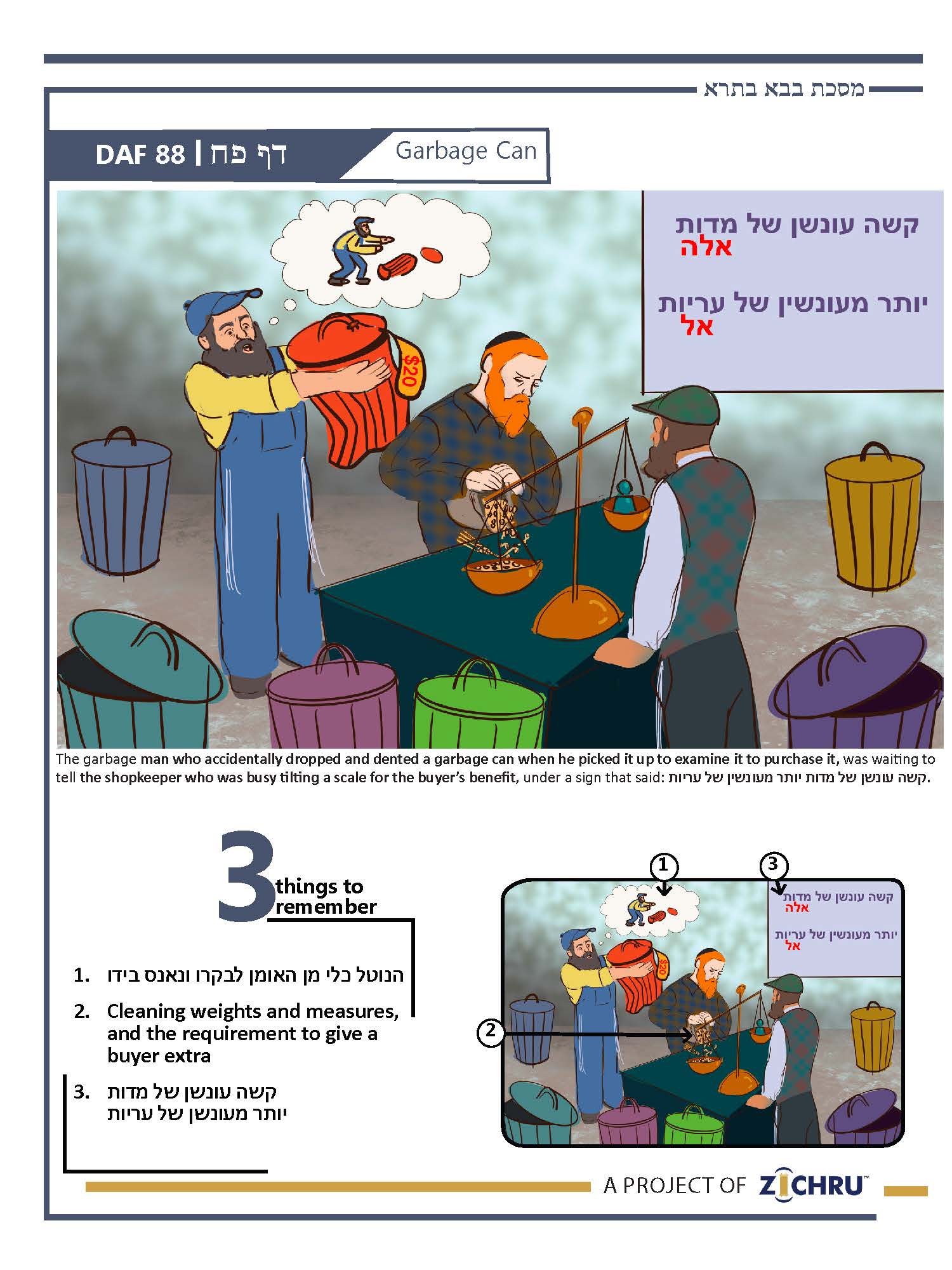Bava Basra - Daf 88
- Audio Timestamps
0:00 - The 3 Sugyos
3:06 - Review of 3 Sugyos
5:55 - Siman
8:18 - 4 Blatt Back Chazarah
14:57 - Pop Quiz (Last 7 blatt)
For access to all Zichru resources including PDFs, and illustrations CLICK HERE
- הנוטל כלי מן האומן לבקרו ונאנס בידו
Shmuel said: הנוטל כלי מן האומן לבקרו – If one takes a utensil from a craftsman to examine it for purchase, ונאנס בידו – and a mishap occurred to it while it was in his possession, חייב – he is liable. Although he can return it, it is his responsibility until then, since he lifted it with the intent to purchase it. The Gemara says this is only דקיצי דמיה – where its price was set, so he can keep it if he decides to purchase it [the Rashbam adds that the item is in high demand]. Two stories are related which reflect this ruling. A Baraisa teaches that one buying vegetables from an am haaretz is not required to separate maaser from those he merely set aside. גמר בלבו לקנותו – But if he decided to purchase them, he acquires them and is obligated in maaser. He cannot return them without separating maaser, nor can he remove it (which decreases their value). Instead, he must separate maaser and reimburse the seller. Although he can technically return it, and should be exempt from maaser, the case is with a ירא שמים, who fulfills "ודובר אמת בלבבו" – and he speaks truth in his heart and commits himself to his decision to purchase. If he does return it, it is like selling it back to the seller.
- Cleaning weights and measures, and the requirement to give a buyer extra
The next Mishnah details how often measures must be cleaned from residue by wholesalers, homeowners, and storekeepers, as well as weights and scales. It continues: וחייב להכריע לו טפח – and he must tilt the scale for [the buyer’s] benefit by a tefach, where this is the practice. היה שוקל לו עין בעין – If he was weighing for him evenly (i.e., where there is no custom to tilt the scale), נותן לו גירומין – he must give him the surplus amount in place of the tilt, which is one to ten for moist items, and one to twenty for dry items. The Mishnah concludes with the required practices for using measuring cups. Reish Lakish says the source for giving a buyer extra is: "וצדק" – “you should have a perfect and just weight,” teaching: צדק משלך ותן לו – act justly from your own possessions and give [the buyer] extra. Rav clarified that the Mishnah’s “one to ten” ratio means one-tenth of a litra per ten litras, totaling one-hundredth.
- קשה עונשן של מדות יותר מעונשן של עריות
Rebbe Levi said: קשה עונשן של מדות יותר מעונשן של עריות – the punishment for fraudulent measures is more severe than for illicit relations, because the Torah wrote "אל" (“these” abominations) regarding עריות, and wrote "אלה" regarding false weights. The Gemara demonstrates that "אל" is an expression of severity, so the longer "אלה" connotes greater severity. Although עריות are punishable by כרת (and false measures are not), an עריות violation is אפשר בתשובה – possible to repent from, but regarding false measures, לא אפשר בתשובה – it is not possible to repent completely, since he may not know whom he cheated. Rebbe Levi said: קשה גזל הדיוט יותר מגזל גבוה – stealing from an ordinary person is more severe than stealing from hekdesh, because regarding the former, הקדים חטא למעילה – [the Torah] mentioned his sin before mentioning his treachery (because his sin begins as soon as he denies possessing someone’s item), but regarding the latter, his treachery is mentioned before his sin (because there is no sin until he uses it).
Siman – Garbage Can
The garbage man who accidentally dropped and dented a garbage can when he picked it up to examine it to purchase it, was waiting to tell the shopkeeper who was busy tilting a scale for the buyer’s benefit, under a sign that said: קשה עונשן של מדות יותר מעונשין של עריות.


